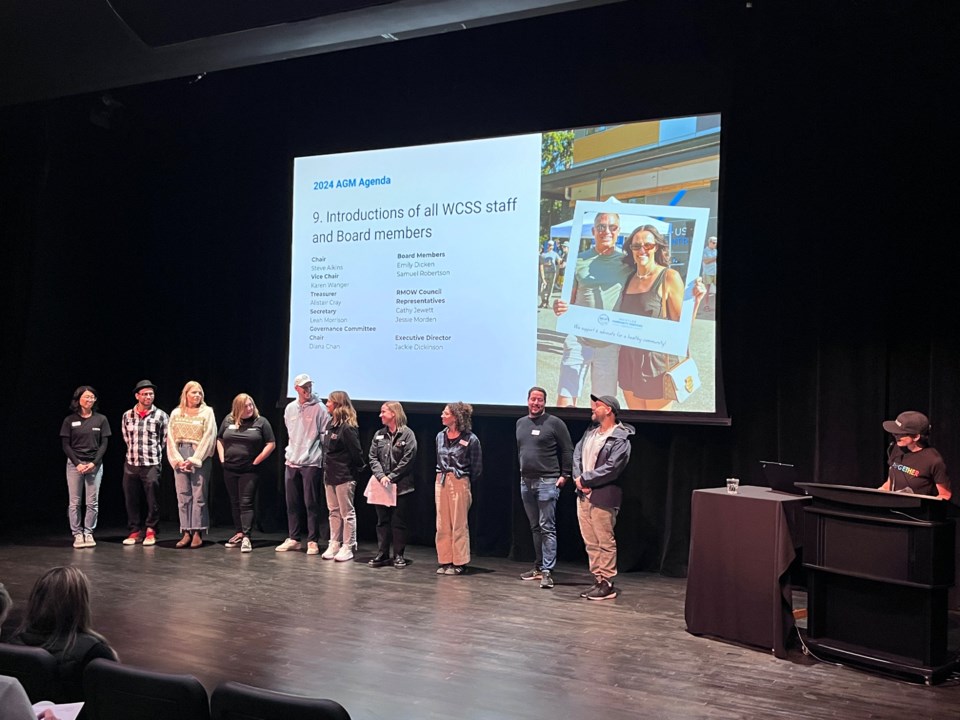The Whistler Community Services Society (WCSS) AGM on Sept. 11 offered a look-in at the state of need in the community, with numbers showing increased usage of the various programs offered.
The AGM showcased the people behind WCSS and a year of activity—and numbers that revealed increasing donations and increasing need.
“This past year was pretty rock and roll with demand for our services through the roof,” said outgoing chair of the WCSS board, Steve Aikins, in comments at the AGM.
“Outreach services are up, [and] breakfast servings are up 30 per cent, closing in on 100,000 servings."
Also of note, Aikins reported use of the food bank was up by 34 per cent in the previous financial year (ended March 31, 2024)—but the current financial year is seeing seemingly sustained growth, too.
“We thought last year was crazy, [this year] food bank visits are up by 45 per cent, outreach by 30 per cent … So again, another huge challenge,” he said, saying WCSS was running on budget as of the end of August, but it would be a challenge to end the year the same.
Aikin noted WCSS has become a staple for many in Whistler over the last few years.
“The food bank was overrun during COVID. The first four months of this year, we’re serving almost three times the number of clients that we did during COVID—how is that even possible?" he said. "This is a town that is really struggling, and it's a shame to see, [but] it's also really beautiful to see how WCSS has become a rock for this community.”
The numbers showcase a story of increased need—but also increased giving by the community.
In raw numbers, total revenues over the last three years have continued to climb year-on-year thanks to the three pillars of revenue sources: The WCSS thrift stores, non-government donations, and government donations.
According to WCSS' financial statements, thrift-store revenues were at $2.23 million in 2024, up from $2.07 million in 2023.
Donations from non-government sources were up, at $1.06 million (compared to $1.01 million the year prior), while government contributions from all three levels of government were down as the pandemic receded.
Overall, revenues stood at $3.49 million for 2024, up from $3.37 in 2023.
“Everything has gone up—this has been the same for everyone in their normal lives. Whether you have a business, at your home, costs are up, supplies are up, wages are up,” said WCSS financial controller Jason Fleming in explaining the numbers.
“Everything has gotten expensive in the last few years, and nothing has been different for WCSS.”
With expenses factored in, the numbers wash out to a deficit of $59,685 for 2024 after WCSS posted a surplus of $256,050 in 2023.
While the thrift stores are bringing in more revenue, they’re also costing more to run. In 2023, their run of costs was $1.42 million, and in 2024 it was up to $1.66 million. Likewise, program costs went from $1.55 million in 2023 to $1.74 million in 2024. General and administrative expenses also saw a bump, from $136,000 in 2023, to $152,000 in 2024.
Fleming explained that “program costs are really scaling up with demand from the community,” but added there were plenty of wins too, with the annual "Nightwalk" doubling the amount raised in only a year.
While the numbers shared Sept. 11 were for the previous financial year, Fleming echoed sentiments by Aikins that this year is much the same.
“Looking forward for this fiscal year … we’re kind of seeing the same as the previous year," he said. "There’s still a lot of demand, and there’s a lot coming in from the community so we want to thank everybody for shopping at the stores, for donating your time, your talent, your treasure, whatever it may be. The community needs it, so thank you.”
WCSS is able to operate at deficits because it operates under non-profit best practices of maintaining reserves of operating costs to ensure it can continue keeping its doors open even when financial situations change.
Speaking with Pique afterwards, executive director of WCSS, Jackie Dickinson, said the organization continues to see housing acting as the main reason people use WCSS' services.
“What we do know is the primary reason people come to the food bank is related to a lack of affordable housing, and that has changed,” she said.
“Pre-pandemic, the reason people came to us was illness and injury. It's still one of our top-three reasons, but we know a lack of affordability is the primary reason that’s affecting everybody. Every part of our community, from senior citizens to newborn babies, the common theme is lack of affordable housing.”
Dickinson said trends for this year show usage of WCSS' various programs is the same, and even trending higher.
“So that’s going to require more revenue,” she said.
“The fact our financial situation has been different in previous years is what's allowing us to keep this engine going. It's important to bring awareness that the financial scorecard has changed for WCSS, and so we’re going to have to think differently about how we raise revenue for our programming, but it will never come at the expense of people not getting the help they need.”




